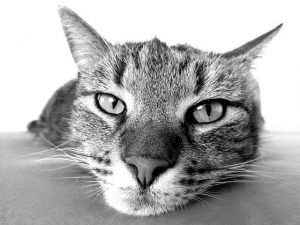In a study published Wednesday in the New England Journal of Medicine, scientists in the U.S. and Japan report that in the laboratory, cats can readily become infected with SARS-CoV-2, the virus that causes COVID-19, and may be able to pass the virus to other cats.

Professor of Pathobiological Sciences at the University of Wisconsin School of Veterinary Medicine Yoshihiro Kawaoka led the study, in which researchers administered to three cats SARS-CoV-2 isolated from a human patient. The following day, the researchers swabbed the nasal passages of the cats and were able to detect the virus in two of the animals. Within three days, they detected the virus in all of the cats.
The day after the researchers administered virus to the first three cats, they placed another cat in each of their cages. Researchers did not administer SARS-CoV-2 virus to these cats.
Each day, the researchers took nasal and rectal swabs from all six cats to assess them for the presence of the virus. Within two days, one of the previously uninfected cats was shedding virus, detected in the nasal swab, and within six days, all of the cats were shedding virus. None of the rectal swabs contained virus.
Each cat shed SARS-CoV-2 from their nasal passages for up to six days. The virus was not lethal and none of the cats showed signs of illness. All of the cats ultimately cleared the virus.
“That was a major finding for us — the cats did not have symptoms,” says Kawaoka, who also holds a faculty appointment at the University of Tokyo. Kawaoka is also helping lead an effort to create a human COVID-19 vaccine called CoroFlu.
The findings suggest cats may be capable of becoming infected with the virus when exposed to people or other cats positive for SARS-CoV-2. It follows a study published in Science by scientists at the Chinese Academy of Agricultural Sciences that also showed cats (and ferrets) could become infected with and potentially transmit the virus. The virus is known to be transmitted in humans through contact with respiratory droplets and saliva.
“It’s something for people to keep in mind,” says Peter Halfmann, a research professor at UW-Madison who helped lead the study. “If they are quarantined in their house and are worried about passing COVID-19 to children and spouses, they should also worry about giving it to their animals.”
Both researchers advise that people with symptoms of COVID-19 avoid contact with cats. They also advise cat owners to keep their pets indoors, in order to limit the contact their cats have with other people and animals.
Read more at University of Wisconsin
Related:
COVID-19: Tiger at the Bronx Zoo tests positive
Bronx Zoo: More big cats test positive for COVID-19
COVID-19: Two pet cats test positive for SARS-CoV-2 in New York
Hong Kong reports COVID-19 in domestic cat, 3rd positive animal


Give them your mRNA “vaccine” shot. It is very safe even for animals. Stupid folks! What is “tested” with RT-PCR? Even the CDC withdraw the Drosten “test” Animals and we humans are living with viruses for a long time. We do have an immune system. So if you grow up on a farm as a child. You fall in the shit or are licked with a cow tongue up and down your immune system is trained every time. Stop panicking!